From Milk to Meals: First Steps in Nutrition Weaning
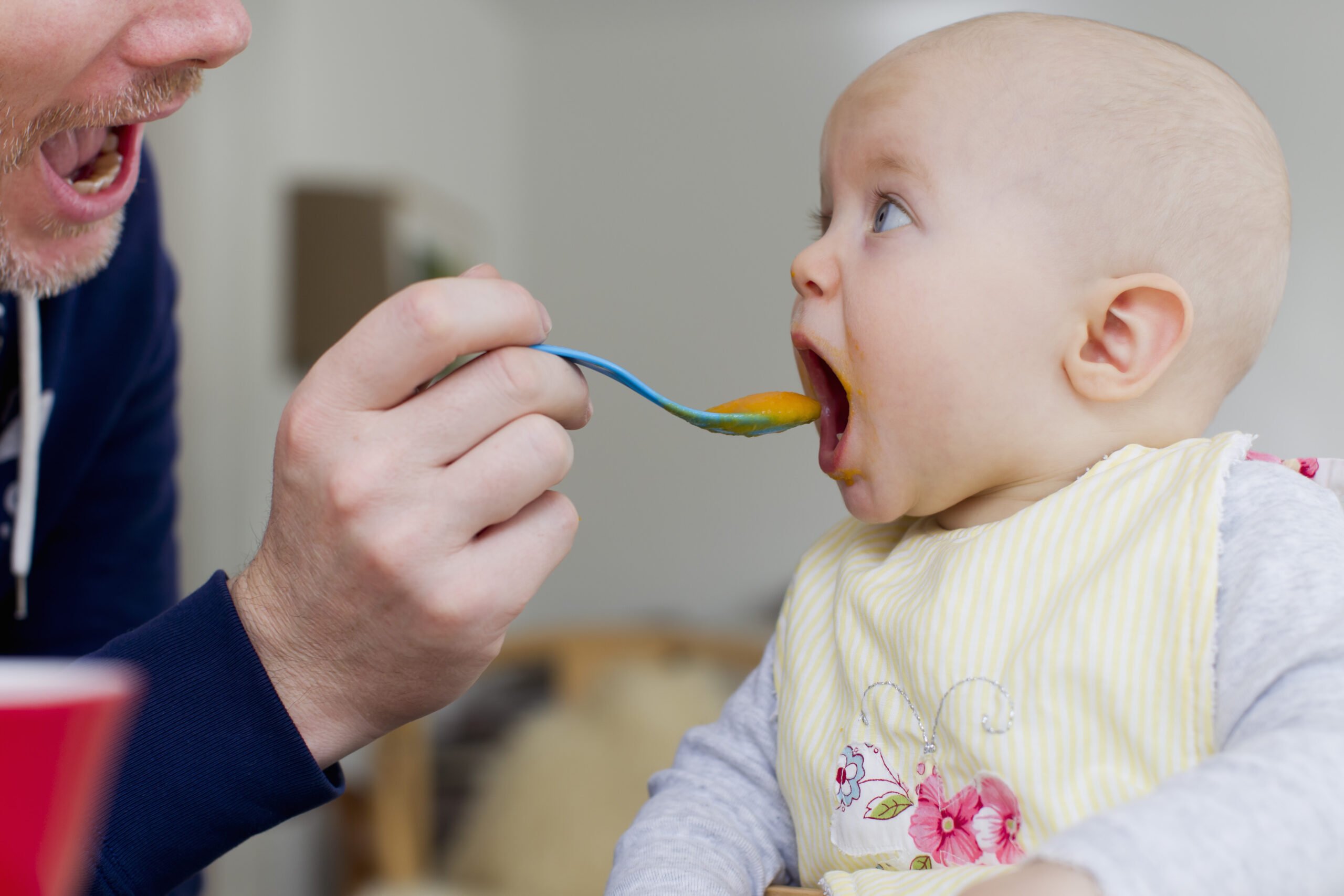
Weaning is such an exciting time and a big step for your little one! Watching your baby experience their first tastes is lots of fun, but with so much information about weaning out there it can be overwhelming, so here are our top tips for planning your baby's nutrition for their first steps on their journey with food.
Food is Fun!
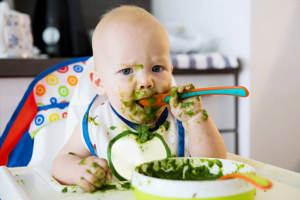
Your baby is ready to start exploring food once they are sitting with their head steady, and have begun to show interest in putting foods (and everything else!) into their mouth. These changes usually happen between 4-6 months.
At first, how much food your baby eats is not as important as encouraging them to explore the idea of food. They will still be getting most of the energy and nutrition from their regular breast or formula milk feeds.
Remember that flavours and textures are all new, so start plain and simple with small portions of a single fruit or vegetable. You can try each food either as smooth puree or a finger food that they can hold and taste. Remove the skins and seeds from fruits and vegetables for the first few months.
Nutrition: Avoiding Added Salt and Sugar
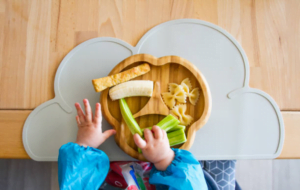
It's important to limit added salt and sugar in food during childhood to avoid health complications.
Babies younger than 1 year of age should have only small amounts of salt in their diet; less than 1g per day. This is because high amounts of salt can't be removed by their kidneys, which are still developing in the first year of life. After 1 year you can start to introduce small amounts of salt, but keeping salt in the diet to a minimum in childhood is generally recommended as eating large amounts can cause conditions like kidney damage and high blood pressure in later life.
Refined sugar (like in sweets, chocolates and canned drinks) can damage your baby's growing teeth and cause obesity. For sweet treats try replacing refined sugar with natural sources of sweetness like fruit. You can find lots of great baby-friendly desert recipes here.
If you are giving ready-made foods always give jars, pouches or snacks that are designed for your baby's age; they will not have too much salt or sugar and are designed for the stage of eating they have reached.
Allergies During Weaning

Some foods can trigger allergic reactions when tried for the first time. Common foods that can cause allergies in some children are:
- Nuts and seeds
- Cows’ milk
- Eggs
- Breads and cereals that contain gluten
- Soya
- Fish and shellfish
You should introduce these foods one at a time in small amounts so that you can spot any reaction.
It’s common for babies to have loose and smelly poo when they’re trying new foods, and that’s normal. Other reactions like lip or face swelling, rashes, vomiting or pain after eating a food can indicate an allergy and you should ask your doctor if you think this has happened. Avoid trying a food again until you have medical advice on how to do this safely.
Explore Nutrition Food Groups
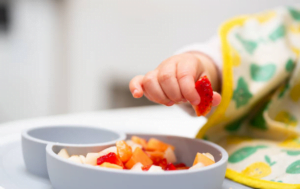
As you introduce new foods you can experiment with items from the main food groups. These are:
Fruits and Vegetables
Important for vitamins and minerals. Mash or blend these and remove seeds and skin for the first few months. You can also try sticks or large chunks to explore as finger food.
Starchy Foods (Carbohydrates)
Important for energy! Slow-release carbohydrates include pasta, bread, rice, potato. Try mixing these with breast of formula milk as a first step.
Proteins
Important for growing muscle and bones. Foods high in protein include meat, fish, eggs, tofu, beans and lentils. Make sure they are well cooked and mashed or blended.
Dairy
Important for vitamins, calcium and fats. Dairy foods include yoghurt, milk, cheese. It's recommended that breast or formula milk with regular cows’ milk after 12 months. This is because cows’ milk has a lower iron level than human milk.
It’s Going to Get Messy!
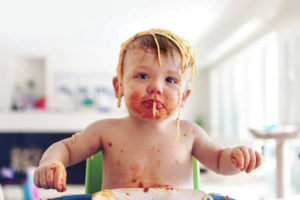
It can be pretty frustrating making a beautiful plate of food only to have your small person lob it across the room at you. To some extent it’s part of the process, and not completely avoidable, however there are a few tips to reduce (some!) of the mess and waste.
- Offer meals to a dedicated area that has easy to wipe down or covered surfaces, including the floor. For toddlers a child friendly table and chairs can help make your little one feel grown up and make meal times fun.
- Use a coverall bib with sleeves.
- Offer small amounts of a few different types of food at one time. This way they can choose what they want to try.
- Keep (many, MANY) cleaning wipes close to hand.
- Put drinks in a beaker or sippy cup.
We hope you found this article useful. Did you know that the Poppet community is a great place to find more helpful tips and resources for your family as well as flexible childcare from local parents and approved providers, all at the touch of a button. Register here today!
Disclaimer: This article is for education purposes and does not constitute medical advice. You should seek advice from a trained medical professional if you have concerns about your child’s health.

